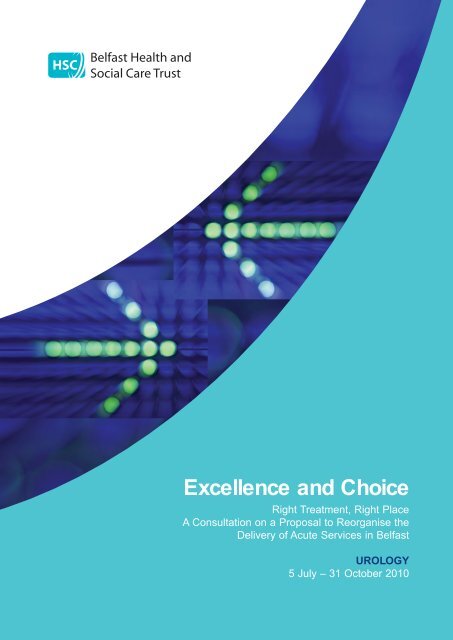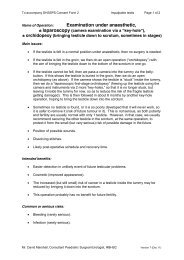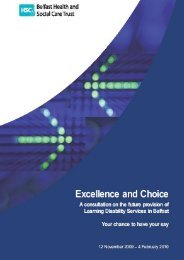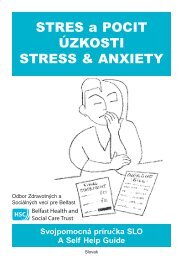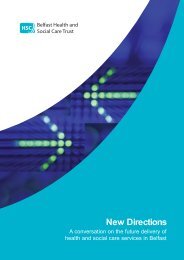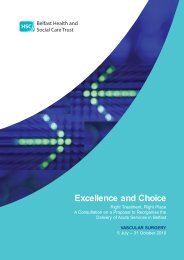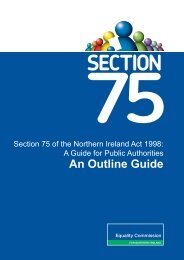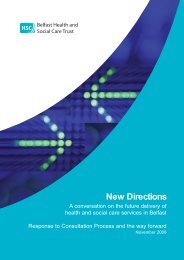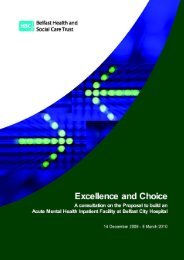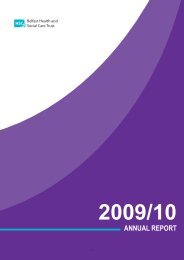Urology - Belfast Health and Social Care Trust
Urology - Belfast Health and Social Care Trust
Urology - Belfast Health and Social Care Trust
- No tags were found...
Create successful ePaper yourself
Turn your PDF publications into a flip-book with our unique Google optimized e-Paper software.
2. How are urology services currently delivered?The urology multi-disciplinary team is made up of urology surgeons, anaestheticspecialist nursing staff, <strong>and</strong> administration staff. Traditionally the field of <strong>Urology</strong> wasone of the many that was delivered by general surgery. In the past 30 years <strong>Urology</strong>has developed <strong>and</strong> evolved as a separate surgical specialty. Higher specialisttraining in General Surgery no longer covers <strong>Urology</strong>, which now has its own trainingprogramme.2.1 What is <strong>Urology</strong>?As a specialty, urology can be sub-divided into a number of special interest areas,most of which also comprise elements of general or ‘core’ <strong>Urology</strong> work.Core <strong>Urology</strong> involves the diagnosis, medical <strong>and</strong> surgical treatment of diseases ofthe kidney, bladder <strong>and</strong> male reproductive organs. Urologists, regardless of specialinterest area, all provide core urology services.Uro-Oncology. Around 40% of urology work is cancer related <strong>and</strong> most of thediagnostics <strong>and</strong> medical or simple surgical treatments are appropriately undertakenoutside of the regional centre. Less than 10% of urological cancers requireradical/complex surgery. Specialist cancer services are based in <strong>Belfast</strong> CityHospital, where there are designated ‘cancer’ urologists.Stones/Endourology includes the management <strong>and</strong> treatment of renal <strong>and</strong> uretericstones. This involves open surgery, endoscopic intervention or stone fragmentationusing a range of techniques <strong>and</strong> is provided at the <strong>Belfast</strong> City Hospital.Andrology includes the treatment of erectile dysfunction, particularly post prostatesurgery, penile curvatures <strong>and</strong> deformities (Peyronie’s disease) <strong>and</strong> other conditionsof the male reproductive organs <strong>and</strong> is provided at both <strong>Belfast</strong> City Hospital <strong>and</strong>Mater Hospitals.Reconstruction: includes reconstruction of urinary continence in men, bladderreconstruction after oncological surgery <strong>and</strong> in a neuropathic bladder, bladderreconstruction in congenital <strong>and</strong> developmental difficulties <strong>and</strong> reconstruction prior totransplantation. The Consultants in <strong>Belfast</strong> City Hospital who specialise in this areawork closely with the uro-oncology team <strong>and</strong> supra regional support is provided byUniversity College Hospital London.Female/functional <strong>Urology</strong> relates to the management <strong>and</strong> treatment ofincontinence <strong>and</strong> bladder dysfunction in women, which on some occasions overlapswith reconstruction surgery. Some of this work is undertaken by urologists at <strong>Belfast</strong>City Hospital although the majority is undertaken by Uro-Gynaecologists.Page 8 of 25
83% of the total inpatient <strong>and</strong> day case service is provided at the <strong>Belfast</strong> CityHospital with 15% at the Mater Hospital <strong>and</strong> 2% at the Royal Hospitals. Patients canaccess the service in one or more of the following ways: As an inpatient: an admission to hospital which includes an overnight stay As a day case: surgical treatment which is carried out in a single day, withoutthe patient having to stay in hospital overnightAs an outpatient: care provided on an appointment basis without requiringadmission to hospital. <strong>Urology</strong> outpatient services are not part of this review.Inpatient general surgery can be delivered along one of two key pathways: Elective: This is when treatment has been planned <strong>and</strong> booked in advance,for example a patient who is placed on a waiting list for an operation <strong>and</strong> thenbrought into hospital on a prearranged day. This is the majority (90%) ofurology work. Non-elective or emergency: This is when a patient accesses urology withoutprior planning, for example via one of the <strong>Trust</strong>’s Emergency Departments.Two of the <strong>Trust</strong>’s acute hospitals, the <strong>Belfast</strong> City Hospital <strong>and</strong> Mater Hospital,currently deliver both elective <strong>and</strong> non-elective <strong>Urology</strong> inpatient services as well asday case procedures <strong>and</strong> outpatients. The Royal Hospitals delivers day case <strong>and</strong>outpatients only. The cancer treatment services are primarily delivered at <strong>Belfast</strong>City Hospital although there is some cancer diagnostic work undertaken at the MaterHospital. Total inpatient <strong>and</strong> day case activity is shown in Figure 1.Figure 1 sets out the <strong>Urology</strong> inpatient Finished Consultant Episodes (FCEs) <strong>and</strong>day case activity across the <strong>Trust</strong>.Page 9 of 25
ActivityFigure 1: <strong>Urology</strong> Activity in Finished Consultant Episodes (FCEs) for Elective<strong>and</strong> Non Elective Inpatients 2009/10<strong>Urology</strong> Inpatient FCEs <strong>and</strong> Daycases 2009/10900080007000600050004000TOTAL Daycases 2009/103000TOTAL Inpatient FCEs 2009/10200010000BCH MIH RVHLocationsSource: <strong>Belfast</strong> <strong>Trust</strong> Information Department May 2010Page 10 of 25
Drive forward service modernisationThe <strong>Trust</strong> <strong>and</strong> the urology service will need to continue improving the efficiency of itsservice provision, including additional improvements in length of stay, admission onday of surgery <strong>and</strong> increased day surgery rates. This is particularly important giventhe tight financial constraints faced by the <strong>Trust</strong>.3.1 What are the main benefits of reorganising urology services?Having identified the key reasons to review urology services, there are a number ofbenefits for patients, staff <strong>and</strong> the hospitals which must be delivered in any proposedchange on delivery or location of service. These were summarised into five keyareas, which guided the work of the project team in their review <strong>and</strong> reorganisationof acute inpatient <strong>and</strong> day surgery services <strong>and</strong> they are:The delivery of safe <strong>and</strong> sustainable services to our patients:Providing safe services <strong>and</strong> ensuring patients are not at risk in our hospitals is ourtop priority. Having appropriately trained staff working in appropriately sized teamswill assist in both improving patient safety <strong>and</strong> sustaining the provision of theseservices.To improve service quality, effectiveness, reduce unnecessary duplication <strong>and</strong>fragmentation of services <strong>and</strong> deliver value for money:Maintaining <strong>and</strong> improving the quality of care experienced by patients is fundamentalto any proposals. Reducing the existing duplication of services across three acutesites will mean patients see the right staff in the right place <strong>and</strong> this will also helpteams deliver a more effective <strong>and</strong> efficient service.The <strong>Trust</strong> must optimise the use of the current operating theatre stock <strong>and</strong> thesupport accommodation available to us <strong>and</strong> ensure that there is some room forfuture growth, should the funding be available.To ensure services are appropriately clinically linked:Delivering services at the right time <strong>and</strong> in the right place requires certain services tobe located close to one another; for example, urology patients will potentially needaccess to gynaecology <strong>and</strong> oncology services.To ensure services are accessible to service users <strong>and</strong> carers.Service users, carers, families <strong>and</strong> visitors want to have easy access to theirservices, whether by public transport or by car.Page 12 of 25
To ensure the Acute Services Plan is compatible with the <strong>Trust</strong> Strategic DirectionThe <strong>Trust</strong> Strategic Direction, which has been previously publicly consulted upon, forthe four adult hospitals is:<strong>Belfast</strong> City Hospital as the centre for cancer, renal <strong>and</strong> a range of generalacute hospital services, with an increased focus on elective services <strong>and</strong> achronic conditions management;Royal Hospitals as the centre for major trauma services, including a heartcentre, with an increased focus on emergency services;Mater Hospital as the centre for ophthalmology services <strong>and</strong> general acutehospital services;Musgrave Park Hospital as the centre of specialist rehabilitation services.The urology project team used these benefits criteria to assess how each serviceoption would deliver improvements for patients <strong>and</strong> staff <strong>and</strong> considered their impacton each hospital.Page 13 of 25
4. Consideration of options for urology servicesA multi-disciplinary project team was established which brought together a broadrange of clinical <strong>and</strong> managerial staff from across the <strong>Trust</strong>, Consultant Urologists,imaging, nursing, Allied <strong>Health</strong> Professionals (AHPs), trades unions, service users<strong>and</strong> other staff identified, <strong>and</strong> made recommendations on the possible options for thefuture delivery of the service.The options that were considered by the Project Team were:1. Continue with current delivery at all three hospitals (<strong>Belfast</strong> City Hospital, MaterHospital <strong>and</strong> The Royal Hospitals)2. Deliver all inpatient <strong>and</strong> day case urology at <strong>Belfast</strong> City Hospital3. Deliver all inpatient <strong>and</strong> day case urology at the Mater Hospital4. Deliver all inpatient <strong>and</strong> day case urology at the Royal Hospitals5. Deliver all inpatient urology <strong>Belfast</strong> City Hospital <strong>and</strong> all day case at MaterHospital6. Deliver all inpatient urology at Mater <strong>and</strong> all day case <strong>Urology</strong> at <strong>Belfast</strong> CityHospital.The project team considered the options against the 5 benefits criteria:To deliver safe <strong>and</strong> sustainable services to our patientsThe service is currently provided across three hospitals. The project team consensuswas that the current service configuration will not enable the service to meet thechallenges of future service delivery as readily as other options.By bringing together all urology services into one acute hospital there are benefits forboth service users <strong>and</strong> staff as the <strong>Trust</strong> will expect to improve productivity, reduceservice duplication <strong>and</strong> share learning <strong>and</strong> expertise between staff. For example,urology patients are more likely in the future to receive day surgery treatment ratherthan be treated as an inpatient. Further additional day surgery facilities will berequired to meet this changing profile of urology, which are not available in allhospitals.The limitations on junior doctor availability due to the Working Time Directive meansthat this medical resource must be better organised in order to make the mostefficient use of their time <strong>and</strong> this can be better accommodated with services on asingle site.The majority of urology services, around 83%, are currently provided at <strong>Belfast</strong> CityHospital <strong>and</strong> 15% at the Mater Hospital <strong>and</strong> 2% at the Royal Hospitals. Thereforethere is insufficient theatre space for the total service to be provided at the MaterHospital or the Royal Hospitals. Option 2 at the <strong>Belfast</strong> City Hospital has thenecessary capacity for the service.Page 14 of 25
To improve service quality, effectiveness <strong>and</strong> reduce unnecessary duplication<strong>and</strong> fragmentation of services <strong>and</strong> deliver value for moneyA single site option would reduce duplication of service provision <strong>and</strong> would thusimprove efficiency. Providing services from one site would yield economies of scale<strong>and</strong> would ultimately be more resource efficient.Option 2 removes service duplication by locating all services in the <strong>Belfast</strong> CityHospital. All members of the urology team would be able to work more closely on asingle site <strong>and</strong> therefore share expertise <strong>and</strong> learning which is key to improvingoutcomes for patients.Options 5 <strong>and</strong> 6 do not contribute to improving service quality <strong>and</strong> effectiveness orreduce unnecessary duplication of services. Rather, they continue with duplication ofthe urology services across three sites.<strong>Urology</strong> services in a single hospital would also offer some resource efficiency as aresult of economies of scale <strong>and</strong> the elimination of duplication.To ensure services are appropriately clinically linkedAt present both the <strong>Belfast</strong> City Hospital <strong>and</strong> Mater Hospitals have access to allessential clinical linkages. There are some linkages which urology want to developfurther for example, the link with uro-gynaecology, <strong>and</strong> general gynaecologyservices, the development of the Laparoscopic Robot, <strong>and</strong> the link with cancerservices. The strengthening of these links would be more difficult if the servicesremained in two or three hospitals.New Directions proposes that <strong>Belfast</strong> City Hospital will become the major centre forelective surgery – this is a key linkage for urology services. The review is alsoproposing that Gynaecology Services will be sited at the <strong>Belfast</strong> City Hospital.Technological advances in robotics can be utilised by uro-gynaecology <strong>and</strong> thusavoid duplication of investment in equipment. Cancer Services are already providedat <strong>Belfast</strong> City Hospital.Options 5 <strong>and</strong> 6 would split the service across two sites, thus compromising theability to meet all of the required clinical linkages.The <strong>Belfast</strong> City Hospital offers the best current <strong>and</strong> proposed clinical linkages forurology.To ensure services are accessible to service users <strong>and</strong> carersThe <strong>Belfast</strong> City Hospital rates well in terms of accessibility – it has good publictransport access via train, bus <strong>and</strong> is situated close to the centre of <strong>Belfast</strong> thusmaking it accessible from all parts of <strong>Belfast</strong>. There are also adequate parkingfacilities at the <strong>Belfast</strong> City Hospital, with a number of patient car parks at variouslocations on the hospital site.Page 15 of 25
The Royal Hospitals has fairly good access to public transport by bus; parking canbe an issue on this site <strong>and</strong> due to the geographical spread of the facilities acrossthe site the proximity of patient car parks to ward areas can vary. Work is ongoing toincrease the number of car parking spaces at the Royal Hospitals.In terms of accessibility, the Mater Hospital is fairly well served by bus. Parkingprovision can be an issue as can the proximity of patient car parks to the wards.To ensure the Acute Service Plan is compatible with <strong>Trust</strong> Strategic DirectionThe <strong>Belfast</strong> City Hospital was identified as the major centre for elective (planned)surgery <strong>and</strong>, given that 90% of urology activity is elective, Option 2 offers morerelevant clinical linkages than Options 3 <strong>and</strong> 4 <strong>and</strong> is compatible with the <strong>Trust</strong>strategic direction.Preferred OptionIn summary, the project team recommendations were that:<strong>Urology</strong> services should be located together at one acute hospital for thekey benefits of streamlined clinical pathways, team working, clinical rotamanagement <strong>and</strong> efficiency in service delivery;The <strong>Belfast</strong> City Hospital offers the best location for the single urologyservice for <strong>Belfast</strong> because:- The <strong>Belfast</strong> City Hospital has the key urology clinical linkages withgynaecology <strong>and</strong> cancer services for both the inpatient <strong>and</strong> day caseservice.- This single service across <strong>Belfast</strong> will help deliver the Regional Reviewof <strong>Urology</strong> which has specifically identified that specialist inpatientservices would concentrate in <strong>Belfast</strong>. Developments in urology willcontinue to require greater use of day surgery <strong>and</strong> short stay (23 hour)units. When the proposed replacement day surgery unit at <strong>Belfast</strong> CityHospital is in place, it is envisaged that a proportion of existing inpatientwork will transfer to day surgery services.- Given that 90% of <strong>Urology</strong> activity is elective (planned) work, a moreefficient service can be provided by bringing the staff <strong>and</strong> resourcestogether in the appropriate facilities.Page 16 of 25
5. What would this mean for patients, staff <strong>and</strong> hospitals?The proposed model for urology is outlined below:The development of a single specialist inpatient <strong>and</strong> day case unit for elective<strong>and</strong> emergency urology services in <strong>Belfast</strong> at the <strong>Belfast</strong> City Hospital.Table 2: <strong>Urology</strong> Service - Current <strong>and</strong> Proposed Service Location(s)<strong>Urology</strong> Service Current Location(s) Proposed Location(s)Core <strong>Urology</strong><strong>Belfast</strong> City Hospital/ <strong>Belfast</strong> City HospitalMater HospitalUro-Oncology <strong>Belfast</strong> City Hospital <strong>Belfast</strong> City HospitalStones/Endourology <strong>Belfast</strong> City Hospital <strong>Belfast</strong> City HospitalAndrology<strong>Belfast</strong> City Hospital/ <strong>Belfast</strong> City HospitalMater HospitalReconstruction <strong>Belfast</strong> City Hospital <strong>Belfast</strong> City HospitalFemale BladderDysfunction<strong>Belfast</strong> City Hospital <strong>Belfast</strong> City Hospital5.1 What does this mean for patients?A single site location for urology services at the <strong>Belfast</strong> City Hospital will haveadvantages for patients, across <strong>Belfast</strong> <strong>and</strong> Northern Irel<strong>and</strong>:Providing safe <strong>and</strong> sustainable servicesBy providing a single consultant on call <strong>and</strong> junior doctor rotas, patients will haveaccess to these staff on site 365 days per year. This is not currently available at theMater Hospital <strong>and</strong> is more sustainable in a single specialist unit.Improving service quality <strong>and</strong> reducing duplicationA single site urology service provides the opportunity to provide more modernservice delivery, for example, 23 hour stay for some procedures. This will reduceservice duplication caused by referring patients between the Mater Hospital <strong>and</strong><strong>Belfast</strong> City Hospital <strong>and</strong> ensure the scarce specialist resources, such as specialistnurses who also support provision of the diagnostic cystoscopy services, areavailable equally to the population.Page 17 of 25
Accessible for users <strong>and</strong> carers<strong>Belfast</strong> City Hospital is in an accessible location for the population of <strong>Belfast</strong> <strong>and</strong>Northern Irel<strong>and</strong>, with good car parking <strong>and</strong> public transport access. By bringing theservice together at the <strong>Belfast</strong> City Hospital, this will improve equity of access forpatients, whereas previously the service delivery by the single consultant at theMater Hospital would have reduced during leave <strong>and</strong> absence.Ensure services are appropriately clinically linkedPatients would benefit from further development of linkages between urologyspecialists <strong>and</strong> cancer services <strong>and</strong> gynaecology, which are proposed to relocatefully to <strong>Belfast</strong> City Hospital.5.2 What would this mean for each hospital?The delivery of safe <strong>and</strong> sustainable servicesJunior doctor rotas would provide cover across the service <strong>and</strong> a single consultanton-call rota will be established. All urology services would be delivered in aspecialist unit in the <strong>Belfast</strong> City Hospital. This would lead to more efficientmanagement of patients, eliminating inequality of access to surgery <strong>and</strong> improvingquality of care for patients, <strong>and</strong> helping the <strong>Trust</strong> to meet waiting time targets for thebenefit of patients.Compatibility with the <strong>Trust</strong> Strategic PlanGiven that 90% of the urology service is elective (planned), this proposal iscompatible with the <strong>Trust</strong> Strategic Plan, with the <strong>Belfast</strong> City Hospital as the maincentre for elective surgery.Ensuring Services are appropriately clinically linkedThe key urology linkages are at the <strong>Belfast</strong> City Hospital with cancer services <strong>and</strong>gynaecology, which is proposed to relocate fully to the <strong>Belfast</strong> City Hospital. As wellas all the benefits for clinical working, this would ensure joint access to technologicaladvances in robotics which will be particularly valuable to urogynae.5.3 What would this mean for staff?Ensuring Services are appropriately clinically linkedAll members of the urology team would be able to work more closely on a single site,sharing expertise <strong>and</strong> learning which is key to improving outcomes for patients. Theurology team would have an increased opportunity to engage in multi-disciplinaryworking with colleagues in, for example, gynaecology <strong>and</strong> cancer services. Multidisciplinaryworking has been shown to improve patient outcomes. There would bea greater number of urologists <strong>and</strong> other multi-disciplinary team members availablefor a single site rota than is possible with the current situation. Staff would benefitPage 18 of 25
from delivering a <strong>Urology</strong> service which is more flexible to meet need <strong>and</strong> respond tothe Working Time Directive challenges as a result of combining services at the<strong>Belfast</strong> City Hospital.Improving service effectiveness <strong>and</strong> reduce duplicationThe urology team would be able to better utilise its staff, facilities <strong>and</strong> equipmentwhen located in one centre <strong>and</strong> not split across three hospitals. In addition, allspecialist urology equipment would be based in one centre instead of duplicated ontwo or three sites, as is the case currently, providing improved efficiencies in theservice.Page 19 of 25
6. WorkforceThe <strong>Trust</strong> would put in place a range of support mechanisms for staff to manage thepotential change process. These may include:Staff support<strong>Care</strong>er counsellingTraining in application <strong>and</strong> interview preparationRetraining/re-skilling for new rolesAdvice <strong>and</strong> guidance on Human Resource policies <strong>and</strong> proceduresThe main impacts anticipated for staff are:RelocationIf the proposal is approved, it would require the relocation of some staff to facilitateall <strong>Urology</strong> services being delivered at the <strong>Belfast</strong> City Hospital. The <strong>Trust</strong> has inplace agreed protocols with Trade Unions on relocation <strong>and</strong>/or redeployment.The protocols have been developed in recognition of the fact that location of work isof major importance to staff, <strong>and</strong> to provide assurance, guidance <strong>and</strong> a processincorporating best practice, <strong>and</strong> the provision for regional agreements on excessmileage <strong>and</strong> the application of the <strong>Trust</strong>’s flexible working agreements.Consideration may be to redeploying staff to other posts in the Mater Hospital.New ways of working/retraining or reskillingAs the <strong>Trust</strong> is proposing to provide all urology services on the <strong>Belfast</strong> City Hospital,staff would be offered appropriate training/retraining if their job roles change.The <strong>Trust</strong> would work in partnership with Trade Union Side to consider how it wouldminimise any adverse impact on the workforce resulting from the proposed changes.Page 20 of 25
7. Your chance to have your say – Consultation QuestionsThe <strong>Trust</strong> wishes to consult as widely as possible on the proposal. Please use thisconsultation questionnaire to register your comments by 31 October.Appendix 1 provides additional information on the <strong>Trust</strong>’s communication,consultation <strong>and</strong> engagement processes <strong>and</strong> how you can be involved.1. Do you agree with the proposal to bring urology services onto a single acutehospital site?2. Do you agree with the proposal to locate urology services at the <strong>Belfast</strong> CityHospital as part of the major elective centre.3. If you do not agree with the proposal to locate urology services at the <strong>Belfast</strong>City Hospital , where do you think the service should be located <strong>and</strong> give yourreasons.Page 21 of 25
Appendix 1 – Programme of Consultation <strong>and</strong> Your Invitation to CommentThis document is one of a suite of documents that represent a formal publicconsultation between <strong>Belfast</strong> <strong>Trust</strong> <strong>and</strong> the citizens we serve on how we would liketo deliver our acute services. The consultation period will open on 5 July 2010 <strong>and</strong>close on 31 October 2010.All the documents will be available to our staff <strong>and</strong> the public using both the <strong>Trust</strong>’sintranet <strong>and</strong> internet pages, <strong>and</strong> by posting them to relevant organisations.We will hold a series of meetings with staff, Trade Unions, service users, carers <strong>and</strong>clients to ensure they are fully engaged in the consultation papers.A report will be presented to <strong>Trust</strong> Board in December 2010. The <strong>Trust</strong> Boardmeeting is open to the public.We are committed to ensuring that we consult broadly on these proposals. If youhave any enquiries regarding the consultation programme, please contact theCommunication Department at <strong>Belfast</strong> <strong>Trust</strong> on 9096 0077.Your invitation to commentPlease tell us your name <strong>and</strong> address at the beginning of your reply. If you arecommenting on behalf of an organisation, please tell us its name <strong>and</strong> what it does. Ifyou have consulted other people or organisations, please let us know.Responses in writing should be sent to:William McKee, Chief Executive<strong>Belfast</strong> <strong>Health</strong> <strong>and</strong> <strong>Social</strong> <strong>Care</strong> <strong>Trust</strong>c/o Public Liaison ServicesCommunications Department1 st Floor, Nore VillaKnockbracken <strong>Health</strong>care ParkSaintfield Road<strong>Belfast</strong>BT8 8BHAlternatively, comments may also be emailed to:stakeholdercomms@belfasttrust.hscni.netPage 22 of 25
Availability in other formatsIf you have any queries about this document, <strong>and</strong> its availability in alternative formatsthen please contact:Orla BarronActing <strong>Health</strong> & <strong>Social</strong> Inequalities Manager1 st Floor, Graham HouseKnockbracken <strong>Health</strong>care ParkSaintfield Road,<strong>Belfast</strong>BT8 8BHTel: 028 9096 0069Fax: 028 9056 6701Textphone: 028 9090 2863E-mail: orla.barron@belfasttrust.hscni.netFreedom of Information Act (2000) – Confidentiality of Consultations<strong>Belfast</strong> <strong>Trust</strong> will publish an anonymised summary of responses following completionof the consultation process; however your response, <strong>and</strong> all other responses to theconsultation, may be disclosed on request. We can only refuse to discloseinformation in limited circumstances. Before you submit your response, please readthe paragraphs below on the confidentiality of consultations <strong>and</strong> they will give youguidance on the legal position about any information given by you in response to thisconsultation.The Freedom of Information Act gives the public a general right of access to anyinformation held by a public authority, in this case, <strong>Belfast</strong> <strong>Trust</strong>. This right of accessto information includes information provided in response to a consultation. Wecannot automatically consider information supplied to us in response to aconsultation as information that can be withheld from disclosure. However, we dohave the responsibility to decide whether any information provided by you inresponse to this consultation, including information about your identity, should bemade public or withheld.Any information provided by you in response to this consultation is, if requested,likely to be released. Only in certain circumstances would information of this type bewithheld.Page 23 of 25
Appendix 2 – Equality <strong>and</strong> Human RightsEquality <strong>and</strong> human rights underpin the services that health <strong>and</strong> social care provide.They are integral to all functions of the <strong>Belfast</strong> <strong>Health</strong> <strong>and</strong> <strong>Social</strong> <strong>Care</strong> <strong>Trust</strong> such asservice delivery, policy formulation, employment <strong>and</strong> procurement.The <strong>Trust</strong> recognises that equality in health <strong>and</strong> social care is not about peoplegetting the same treatment – equality means people accessing person-centred,person-led, quality care which meets their needs.Human rights are founded on 5 fundamental values: fairness, respect, equality,dignity <strong>and</strong> autonomy. The <strong>Trust</strong> has incorporated both respect <strong>and</strong> dignity in itscorporate values <strong>and</strong> behaviours.Moreover, the <strong>Trust</strong>’s higher purpose is to improve health <strong>and</strong> well-being <strong>and</strong> reducehealth inequalities - by working in partnership with others <strong>and</strong> by engaging with staffto deliver safe, improving, modernising cost effective health <strong>and</strong> social care.Under Section 75 of the Northern Irel<strong>and</strong> Act 1998, the <strong>Belfast</strong> HSC <strong>Trust</strong> is obligedto consider the implications for equality of opportunity <strong>and</strong> good relations. As part ofthis assessment, the <strong>Trust</strong> also considers implications for human rights <strong>and</strong>disability. This means the <strong>Trust</strong> is not only morally <strong>and</strong> ethically bound to deliver itsacute services to its users in an equitable fashion with respect <strong>and</strong> dignity; but it alsois statutorily bound to do so.Section 75 of the Northern Irel<strong>and</strong> Act 1998Section 75 (1) of the NI Act 1998 requires <strong>Belfast</strong> HSC <strong>Trust</strong>, in carrying out its work,to have due regard to the need to promote equality of opportunity between personsof different religious belief, political opinion, racial group, age, marital status orsexual orientation, between men <strong>and</strong> women generally, between persons with adisability <strong>and</strong> persons without <strong>and</strong> between persons with dependants <strong>and</strong> personswithout. Section 75 (2) requires the <strong>Trust</strong> to promote good relations between personsof different religious belief, political opinion or racial group.The <strong>Trust</strong> is carrying out an equality impact assessment on this proposal to ensurethat it undergoes a full <strong>and</strong> systematic analysis to firstly, determine the extent ofdifferential impact upon the 9 aforementioned groups <strong>and</strong> secondly establish if thatimpact is adverseIf so, the <strong>Trust</strong> must consider alternative policies to better achieve equality ofopportunity or measures to mitigate the adverse impact.The <strong>Belfast</strong> <strong>Health</strong> <strong>and</strong> <strong>Social</strong> <strong>Care</strong> <strong>Trust</strong> is committed to listening to the view ofstaff, service users, carers <strong>and</strong> families <strong>and</strong> advocacy groups <strong>and</strong> the wider public<strong>and</strong> making an informed decision on the basis of these consultation responses.Page 24 of 25
Appendix 3 – GlossaryGlossary of abbreviationsAHPBCHEDEQIAWTDFCENIASRGHSpRAllied <strong>Health</strong> Professional<strong>Belfast</strong> City HospitalEmergency DepartmentEquality Impact AssessmentWorking Time DirectiveFinished Consultant EpisodeNorthern Irel<strong>and</strong> Ambulance ServiceRoyal Group of HospitalsSpecialist RegistrarGlossary of termsAllied <strong>Health</strong>ProfessionDay caseElective surgeryEmergencysurgeryWorking TimeDirectiveFinishedConsultantEpisodeA clinical profession distinct from medicine, dentistry <strong>and</strong>nursing, such as physiotherapy, occupational therapy, speech<strong>and</strong> language therapy <strong>and</strong> dieteticsA surgical procedure carried out without an overnight hospitalstayA surgical procedure which has been planned <strong>and</strong> booked inadvanceA surgical procedure which is of an urgent nature <strong>and</strong> has notbeen planned or booked in advanceA law seeking to protect the health <strong>and</strong> safety of workers whichlimits the number of hours that doctors are allowed to work overan average weekAn episode of medical treatment during which a patient is underthe care of a single, named consultantPage 25 of 25


